NHS pay proposal criticised by health unions
- Published
- comments

The NHS's £109bn budget is under severe pressure
Unions have criticised government moves to halt a 1% pay rise for all NHS staff in England.
The Department of Health said the increase was unaffordable alongside the current system which sees many staff automatically receive incremental annual rises.
It has urged the NHS pay review body, external to withhold the rise for 1.3m staff.
Rachael Maskell, of the Unite trade union, said staff deserved the pay reward for "holding the NHS together".
Health trusts are currently under pressure to make savings and the NHS wage bill accounts for around 40% of its budget.
All public sector pay increases are capped at 1%.
The Department of Health (DoH) proposes using the funding intended for the rise to "modernise" pay structures.
Unite's Rachel Maskell: "1% is really a miserly increase into their wages"
It says automatic increments - linked to length of service and satisfactory performance - add £900m to salary costs.
The DoH has stressed no decisions on changes to pay have been taken, insisting independent bodies will make their recommendations in February or March next year.
But the plans, outlined in the DoH's submission to two independent pay review bodies, have been criticised by Unite and Labour.
Ms Maskell, of Unite, said: "The Department of Health have got other choices. They're entering into a reorganisation which is costing £3bn, which nobody asked for and isn't adding anything to patient care.
"It is about choices and the NHS staff have already had two years of a pay freeze - 1% last year - and, quite frankly, are really falling behind inflation now with their wages."
Staff morale
She told BBC Radio 4's Today programme motivation and morale was down among frontline health workers "at this very difficult time".
However, in its submission the DoH points to a staff survey suggesting high levels of motivation and morale and says there should only be basic pay increases if there is "strong evidence" recruitment, retention, morale or motivation issues require this.
Shadow health secretary Andy Burnham said the NHS reorganisation had taken money out of front-line services.
Shadow Health Secretary Andy Burnham said the pay constraint on staff was ''a kick in the teeth''
"There has to be pay restraint in the NHS as well as other public services... but the NHS has been through some very difficult years - so have NHS staff - and this was a modest increase to recognise the pressure that all families are under.
"To take it away, to break that promise, is just another kick in the teeth."
Staff representatives have also reacted angrily to the plans.
"What they have done is inflammatory," said Christina McAnea, head of health at Unison and joint chairwoman of the NHS Staff Council.
"We are not going to negotiate while a gun is held to our head for a paltry 1% pay rise - our members will not react well to that."
Dr Mark Porter, chairman of the British Medical Association council said this would not result in staff leaving in their "droves".
However he added: "We're going to find it increasingly hard to recruit, partly for the specialist skills and partly for the numbers of staff that we'd need to bring into the health service to implement the safe minimum staffing levels."
Health Minister Anna Soubry says the NHS needs a "modern, fit for purpose" pay system
Health minister Anna Soubry defended the government 's stance telling the BBC: "This is about making sure we pay our NHS staff well and we reward their improvement in skills.
"This system works in other public sectors and the private sector. People want to make sure that they are getting good quality, first class services especially at a time when the NHS faces challenges."
Earlier a DoH spokeswoman said: "Many NHS staff have continued to receive pay rises of up to 3.5% and we want to keep working with the trade unions and employers on affordable pay.
"The measures we are proposing will help increase quality for patients and help us realise our vision of an affordable seven-day service."
In June Chancellor George Osborne said ministers were working to "remove automatic pay rises" for teachers, health professionals, prison and police staff.
The DoH drew attention to Mr Osborne's comments and confirmed it wanted NHS pay to have "stronger links to performance, quality and productivity".
- Published26 June 2013
- Published22 April 2013
- Published5 October 2012